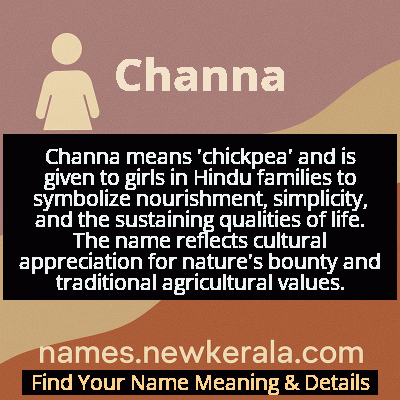Channa Name Meaning & Details
Origin, Popularity, Numerology Analysis & Name Meaning of Channa
Discover the origin, meaning, and cultural significance of the name CHANNA. Delve into its historical roots and explore the lasting impact it has had on communities and traditions.
Name
Channa
Gender
Female
Origin
Hindu
Lucky Number
5
Meaning of the Name - Channa
Channa means 'chickpea' and is given to girls in Hindu families to symbolize nourishment, simplicity, and the sustaining qualities of life. The name reflects cultural appreciation for nature's bounty and traditional agricultural values.
Channa - Complete Numerology Analysis
Your Numerology Number
Based on Pythagorean Numerology System
Ruling Planet
Mercury
Positive Nature
Adventurous, dynamic, curious, and social.
Negative Traits
Restless, impatient, inconsistent, prone to indulgence.
Lucky Colours
Green, white.
Lucky Days
Wednesday.
Lucky Stones
Emerald.
Harmony Numbers
1, 3, 9.
Best Suited Professions
Sales, marketing, travel, entertainment.
What People Like About You
Versatility, charisma, adventurous spirit.
Famous People Named Channa
Channa Wijewardena
Actress
Leading roles in Sinhala cinema and television
Channa Daswatte
Architect
Architectural conservation and heritage preservation
Channa Upuli
Dancer
Preservation and teaching of traditional Kandyan dance
Name Variations & International Equivalents
Click on blue names to explore their detailed meanings. Gray names with will be available soon.
Cultural & Historical Significance
Throughout South Asian history, food-based names like Channa have been popular as they connect individuals to the land and traditional ways of life. In Hindu philosophy, the simplicity of basic foods like chickpeas represents the virtue of contentment with life's essentials. The name also appears in various regional folk tales and proverbs, often symbolizing how small things can have great value. During festivals like Makar Sankranti and other harvest celebrations, chickpeas feature prominently in traditional foods, further reinforcing the name's cultural resonance and connection to seasonal cycles and agricultural traditions.
Extended Personality Analysis
Women named Channa are often perceived as grounded, nurturing individuals with strong practical sensibilities. They typically exhibit qualities of reliability, warmth, and a natural ability to care for others, much like the nourishing properties of the chickpea that inspires their name. These individuals tend to be resourceful problem-solvers who approach challenges with patience and determination. Their personality often combines traditional values with adaptive intelligence, allowing them to thrive in various circumstances while maintaining their core identity. Channas are frequently described as having a calming presence and the ability to create harmony in their relationships and environments.
In social settings, Channas often display remarkable emotional intelligence and empathy, making them excellent listeners and trusted confidantes. They tend to be family-oriented with strong connections to their cultural roots, while simultaneously embracing modern perspectives. Their practical nature makes them excellent at managing resources and creating stable, comfortable homes. Many Channas exhibit a quiet strength that emerges during difficult times, showing resilience and the ability to support others through challenges. Their name's association with a fundamental food source often translates into a personality that values substance over superficiality and genuine connections over casual acquaintances.
Modern Usage & Popularity
In contemporary times, Channa remains a popular name in Hindu communities across India, Sri Lanka, and the diaspora. While not among the most common names, it maintains steady usage particularly in agricultural regions and among families valuing traditional, nature-inspired names. The name has seen renewed interest with the growing awareness of healthy eating and sustainable living, as chickpeas have gained global popularity as a superfood. Modern parents often choose Channa for its earthy, wholesome connotations and connection to cultural heritage while being relatively unique in Western countries. The name's simplicity and easy pronunciation across languages have contributed to its enduring appeal, and it frequently appears in urban areas as parents seek names that balance tradition with contemporary relevance.
Symbolic & Spiritual Meanings
Symbolically, Channa represents nourishment, fertility, and the cycle of life. The chickpea's transformation from a small seed to a life-sustaining food source mirrors human growth and development. It symbolizes humility grounded in strength, as the modest legume provides essential nutrition despite its simple appearance. The name also carries connotations of abundance and prosperity, as chickpeas have historically been associated with good harvests and food security. In spiritual contexts, it represents the idea that true value often lies in simple, fundamental things that sustain life and community. The chickpea's role in traditional medicine and Ayurveda further enhances its symbolic connection to healing and holistic well-being.

